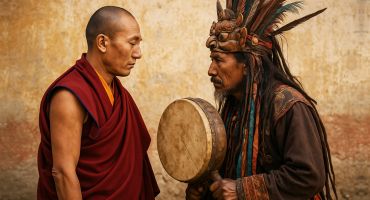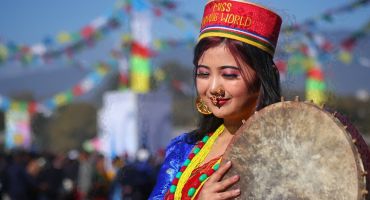Yalambar in the Mahabharata? I fail to understand why the Kirati Khambus place so much importance on the Mahabharata. Mahabharata, the Indian epic, is literature while the Kiratis including Yalambar and his progeny are real historical figures. The history of the Kirata dynasty in the ancient Himalayas comes with conclusive empirical proof derived from ancient chronicles and archaeological findings. If you read the history of the Indian subcontinent right from the Indus Valley Civilization to the Mauryas and the Guptas, there is absolutely no evidence to support the Ramayana and the Mahabharata. You will, however, find the political prominence of the Kiratis in that period.
It is no wonder that they found mention in the works of popular literature like the Ramayana and the Mahabharata. But they are works of fiction and must not be taken as a history lesson. Mahabharata is written on a logical surmise while targeting the metaphysical while the Kiratis always had the metaphysical embedded in the Mundhum through Sumnima and Paruhang. Our logic and truth however, is based on Yalambar and his descendants. So why transform history into fiction? Why are Kirati Khambus hell bent on making Yalambar a fictional hero, slain by Krishna, rather than seeing him as a historical figure who conquered Kathmandu (which by the way is a fact)?

The Mahabharata talks about this powerful king called Babarik who would turn the tides of the Kurukshetra war by taking the Pandava side and Krishna chops off his head, to avoid the calamity. Nepali Newars of Kathmandu, especially the “Jyapu” community believe that this chopped off head flew all the way to Kathmandu and landed on the site where the famous “Akash Bhairav” temple stands today. Many Newars believe that the head belongs to the great Kirati King Yalambar and the Kiratis have widely accepted this claim without any historical data or reference. This idea of bringing together elements that would ordinarily be considered at odds with one another is utterly baffling and can be owed to the dominant ascension of Hindu superiority in mainstream Kirati culture and traditions.
It has now become evident that fictions of literary make-believe and cultural beliefs are sometimes functionally identical. One can also argue that, since both historical and literary source materials are linguistic, figurative ones, they must be interpreted in similar ways. But even though the Kirati Khambus claim Yalambar’s appearance in the Mahabharata, the epic itself does not mention the name Yalambar or Yalam or Yellung. This only proves that the Kiratis, while revering Mahabharata and the Hindu Gods have actually not real the epic poem and only reiterate the rumors that they have somehow heard over the years.

Involved here is more than a mere squabble over face and fiction. It is related to cultural inferiority complex that seem to subdue Kirati life. The idea of the Mahabharata cannot be separated from its values, information and ideology, the original idea behind the conception of the epic. But for the Kiratis, the myth seems to be a soft power and Hindu propaganda exuded over the centuries on indigenous tribal population. With the addition of the Yalambar lore to the Mahabharata, the Kiratis have utterly failed to differentiate reality from myth and life from literature. This idea only reflects a belief in the existence of some sort of “objective”, to be in a cultural equation with popular Indian Hindu culture. This in itself, is a very dangerous proposition for the Mundhum way of life. This means that the Kirati Khambu have genuinely confused Yalambar with a fiction idol subconsciously and reject the evidences collected through the Gopalarajavamshali and the Padmagiri Vamshali.
Mahabharata is neither history nor a biography. So why do we attach so much value to what’s written in the Mahabharata? Are we not confusing history with fiction? I believe that Kirati Khambus have yet to discard their Hinduism hangover and stop basing historic credentials on the scripture of the Hindus. I am not against any epic or the mention of our kings in those epics. What I do resent is that we base our history on these epics rather than rely on historical facts. If we believe that Yalambar participated in the Mahabharata, we will have to also believe in the existence of Krishna as well as of Ganesha writing that book for humanity. As Kiratis with a major identity crisis, our objective must be the search of truth and not to get lost in fiction or fantasy. Or are we looking for a Mahabharata certificate of approval for Yalambar to exist?





Sir what is the fathers name of Yalambar?